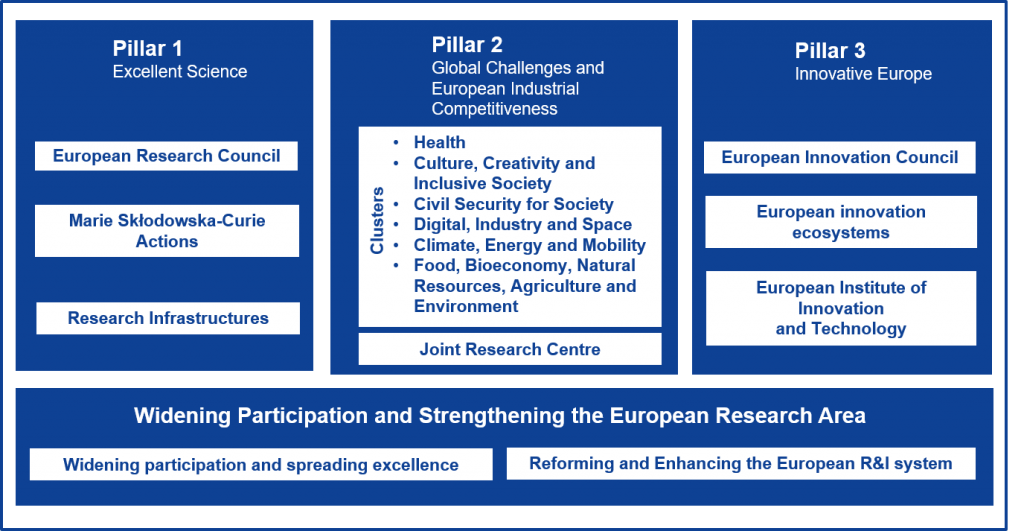An Update on European Funding
 On the 24th December, the UK Government announced that it had reached an agreement with the EU, following months of negotiations. The deal has important implications for European funding opportunities and will affect those involved in UK Research and Development. We have summarised the key things that you need to know below:
On the 24th December, the UK Government announced that it had reached an agreement with the EU, following months of negotiations. The deal has important implications for European funding opportunities and will affect those involved in UK Research and Development. We have summarised the key things that you need to know below:
1. Continued participation in Horizon Europe
Firstly, the UK will continue to participate in a number of EU programmes for the period 2021-2027. This includes Horizon Europe – the EU’s €95.5 billion framework for research and innovation, for which it will have Associated Country status. This is subject to a financial contribution from the UK to the EU budget.
2. The end of Erasmus+
The UK Government has decided not to participate in the Erasmus exchange programme due to the cost of continued membership. It will be replaced with a £100 million national scheme, known as Turing, after the mathematician Alan Turing. This will start in September 2021.
3. The EIC Accelerator - what we know so far
We have received confirmation that UK businesses will remain eligible to apply for grant funding from the EIC Accelerator. However, they will no longer be able to participate in the European Innovation Council Fund, the part of the EIC Accelerator that provides investment through equity or other repayable forms.
4. Eureka Eurostars - continued opportunities for transnational innovation
The UK’s departure from the EU does not affect participation in the Eureka programme and its various funding streams. Therefore, it offers a continued source of European funding opportunities for UK SMEs that engage in transnational innovation. The next competition has a deadline of the 4th February, which you can find more information on here.
5. Freedom of movement ends - implications for researchers
Due to restrictions placed on freedom of movement, UK researchers will require visas for stays of over 90 days in the EU.
The deal answers some pertinent questions surrounding the future of UK participation in EU funding streams. Overall, we are pleased that a deal was reached and that the UK will participate in Horizon Europe. We will keep you updated on any further developments in the coming months, but if you have any questions, please do not hesitate to get in touch.
The Innovation Fund: €10 Billion Available for Low-Carbon Technology Projects
 Background
Background
The EU Innovation Fund is one of the world’s largest funding programmes for low-carbon technology projects. It will provide around €10 billion of support between 2020 and 2030, supporting Europe's transition to net-zero. By helping businesses invest in clean energy and industry, the Innovation Fund will boost economic growth, create local future-proof jobs, and reinforce European technological leadership on a global scale.
First announced in 2019 and funded by the EU Emissions Trading System, the fund launched its first competition in July 2020. It replaced the Ner300 programme and holds numerous advantages over its predecessor; it improves the risk-sharing for projects by giving more funding in a more flexible way. Not only this, but it has a simpler selection process and is also open to projects from energy-intensive industries.
Scope
Funding is available for both large and small-scale projects. In general, eligible projects will focus on one of the following themes:
- Innovative low-carbon technologies and processes in energy-intensive industries
- Carbon capture and utilisation
- Construction and operation of carbon capture and storage
- Innovative renewable energy generation
- Energy storage
Application Process
For large-scale projects, there is a two-stage application process. Firstly, there is an expression of interest stage, judging project effectiveness, degree of innovation, and project maturity. Then, the second stage is a full application; it considers all the same criteria, as well as scalability and cost-efficiency. In contrast, small-scale calls have just one stage, this being the full application. The Innovation Fund will support up to 60% of the additional capital and operational costs of large-scale projects and up to 60% of the capital costs of small-scale projects.
The first call for small-scale projects is now open and will close on 10th March 2021. For more information, visit the European Commission website. Alternatively, please contact us if you have any questions or would like to arrange a free consultation.
We are unsure whether UK organisations will be able to participate in EU funding streams following Brexit. Sign up for our free monthly newsletter for the latest updates, as well as alternative grant funding opportunities.
Source: European Commission
Innovative medical imaging camera project led by Thermetrix awarded over €578k from Eureka-Eurostars
 RedKnight is delighted to have supported South Wales based start-up, Thermetrix Ltd, with a successful application to the Eureka Eurostars programme. Since 2017, Thermetrix have designed and manufactured hardware and software for medical devices in personal healthcare. The company, along with two SME partners, Quantificare (France) and SymblCrowd (Germany), will now receive €578, 684 in grant funding to develop its Multi-Modal Medical Mapper (M4).
RedKnight is delighted to have supported South Wales based start-up, Thermetrix Ltd, with a successful application to the Eureka Eurostars programme. Since 2017, Thermetrix have designed and manufactured hardware and software for medical devices in personal healthcare. The company, along with two SME partners, Quantificare (France) and SymblCrowd (Germany), will now receive €578, 684 in grant funding to develop its Multi-Modal Medical Mapper (M4).
Aims
M4 aims to deliver a prototype of a portable camera that integrates 3D scanning, visual and (thermal) infrared imaging modalities. As the user moves the camera along the human body under investigation, it will capture and display the three representational characteristics in a single 3D representation. During the scanning process, graphical overlays will adaptively guide the user. This will minimise the amount of training required and improve the reliability and repeatability of scans.
The project is disruptive in the digital medical devices sector as there are no existing devices capable of performing all functions at the same time. Therefore, this device opens entirely new possibilities for prevention, diagnosis, and treatment, in areas including Diabetic Foot Ulcer treatment, medical aesthetics and wound healing. Importantly, M4 addresses a pressing need for more accurate, reliable devices for wound measurement and management of higher practicality. It will also be usable by all healthcare professionals in various settings and at commoditised price points.
Outcomes
Combined, the global Diabetic Foot Ulcer, Wound Care Management and Medical Aesthetics markets are worth $53.77bn. They pose significant socio-economic challenges to both patients and healthcare systems worldwide. With anticipated high reliability and accuracy, M4 could reduce costs by 13%, saving the EU over $1 billion each year. Crucially, M4 could also save patient lives and improve quality of life for many.
Dr Peter Plassmann, Founder and CEO at Thermetrix said of the success,
“It would have been impossible for us to navigate the complex and time-consuming Eurostars application process on our own. The support from RedKnight was crucial for the success in this highly competitive competition. ”
You can read about more of our recent success stories here. If you would like to discuss your own project with one of our expert advisers, please contact us today.
Horizon Europe: New Horizons for European Funding
2020 marks the end of Horizon 2020, the EU’s biggest ever EU Research and Innovation programme, which has provided nearly €80 billion of funding over 7 years (2014-2020). Succeeding Horizon 2020, Horizon Europe will run from 2021 to 2027 to ensure that Europe remains a world-class leader in Research and Innovation. The European Commission will invest €100 billion into Research and Innovation that will shape the future of Europe, making it the most ambitious programme of its kind.
“With Horizon Europe, we want to build on this success and continue to make a real difference in the lives of citizens and society as a whole.”
-European Commission Vice-President Jyrki Katainen, responsible for Jobs, Growth, Investment and Competitiveness.
Preliminary Structure of Horizon Europe

Like Horizon 2020, the programme will have three pillars. The first will fund excellence in science, supporting frontier research projects designed by researchers through the European Research Council. The second pillar focuses on Global Challenges and European Industrial Competitiveness. It will support research into societal challenges and reinforce technological and industrial capacities. It also sets ambitious EU-wide missions to tackle some of Europe’s biggest problems, including health and climate change. Thirdly, the Innovative Europe pillar aims to increase Europe’s prowess in market-creating innovation and SME growth through the European Innovation Council.
Following the Horizon 2020 Interim Evaluation, the European Commission has implemented several changes to support Research and Innovation across Europe. For example, they will support breakthrough, high-risk innovation through the creation of the European Innovation Council. This will help innovators to create new market opportunities. Additionally, through the launch of new missions with bold, ambitious goals, Horizon Europe will create more impact across Europe. An open science policy will enable better science through collaborative ways of producing and sharing knowledge and data. Further, an emphasis on widening participation will help low Research and Innovation performing Member States to participate in Horizon Europe.
Despite the uncertainty caused by Brexit, we are hopeful that the UK will remain a part of the Horizon Europe research programme. If you'd like to discuss European funding with one of our specialist advisers, please do not hesitate to contact us today.
To stay updated on the grant funding landscape, sign up to our free monthly newsletter, and receive expert insights direct to your inbox.
